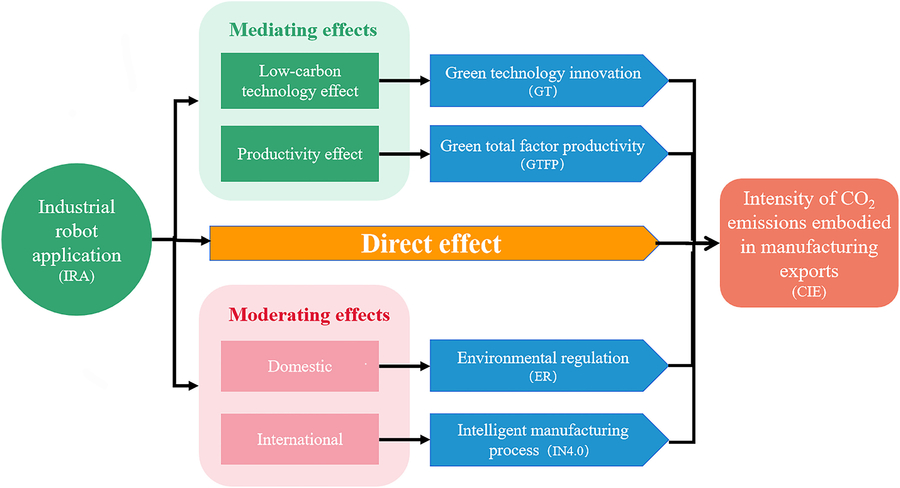Green Manufacturing: The Impact of Industrial Robots on Export Emissions
KNOXVILLE, TN, December 24, 2024 /24-7PressRelease/ — The rapid expansion of global trade has brought with it a sharp rise in greenhouse gas emissions, much of which is linked to manufacturing exports. As nations address climate change, understanding how industrial automation can help mitigate this environmental impact has become a priority. Industrial robots are increasingly seen as a potential solution to reducing emissions in manufacturing, but the extent of their effectiveness and the underlying factors driving emissions reductions require deeper analysis. This study aims to fill that gap, providing new insights into how automation in manufacturing can influence global carbon footprints.
Researchers from Jiangsu University and Shaoxing University have published a new study (DOI: 10.1016/j.dsm.2024.09.003) in Data Science and Management on October 5, 2024, examining the impact of industrial robots on CO2 emissions associated with manufacturing exports. The study, which analyzes panel data from 37 countries over two decades, offers valuable insights into the role of automation in promoting sustainable manufacturing practices and its potential to reduce carbon emissions in global trade.
The study reveals a significant reduction in CO2 emissions embodied in manufacturing exports (CIE) due to the application of industrial robots (IRA). This reduction highlights the potential of robotic automation to lower the carbon intensity of exported goods. However, the research also identifies a U-shaped relationship, with emissions initially decreasing before reaching a plateau. This effect, often referred to as a rebound, suggests that while industrial robots can effectively reduce emissions, their long-term sustainability depends on how they are integrated into broader manufacturing processes. The study also finds that the impact of IRA varies across different sectors, with medium-tech industries experiencing the most notable reductions in emissions. Furthermore, the effectiveness of industrial robots in reducing CO2 emissions is influenced by advancements in low-carbon technologies, productivity improvements, and the presence of robust environmental regulations. The study’s nuanced findings emphasize that while automation presents opportunities for greener trade, careful management and a focus on policy alignment are essential for achieving lasting environmental benefits.
“Integrating industrial robots into manufacturing processes is not just a technological upgrade—it’s a crucial step towards realizing global sustainability goals,” says Dr. Xiaoli Wu, the corresponding author of the study. “Our findings show that automation can help lower emissions significantly, but this is most effective when combined with strict environmental policies and the adoption of smart manufacturing practices. This research highlights the importance of aligning technological advances with sustainability initiatives.”
The study’s findings have important implications for policymakers and industry leaders. It underscores the need for policies that support the development and adoption of industrial robots, while also fostering green technological innovation. Moreover, the research suggests that incorporating smart manufacturing practices—such as integrating low-carbon technologies and adhering to stringent environmental standards—can maximize the emission-reduction potential of industrial robots. By promoting these strategies, manufacturers can not only drive down emissions but also help steer global trade towards a more sustainable and eco-friendly future.
References
Original Source URL
https://doi.org/10.1016/j.dsm.2024.09.003
Funding information
The authors would like to acknowledge the National Social Science Foundation of China (Grant No.: 23FGLB024) to provide fund for the study.
About Data Science and Management
Data Science and Management (DSM) is a peer-reviewed open access journal for original research articles, review articles and technical reports related to all aspects of data science and its application in the field of business, economics, finance, operations, engineering, healthcare, transportation, agriculture, energy, environment, sports, and social management. DSM was launched in 2021, and published quarterly by Xi’an Jiaotong University.
Contact
Yue Yang, dsm@xjtu.edu.cn
Chuanlink Innovations, where revolutionary ideas meet their true potential. Our name, rooted in the essence of transmission and connection, reflects our commitment to fostering innovation and facilitating the journey of ideas from inception to realization.
Related Link:
http://chuanlink-innovations.com
—
For the original version of this press release, please visit 24-7PressRelease.com here




